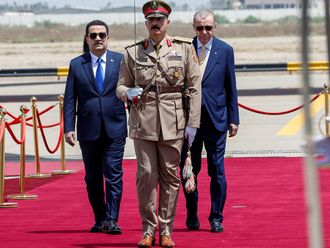Baghdad: New waves of dispute have risen between Iraqi political forces in Baghdad as the Iraqi and US authorities aim to reach a long-term strategy by July 31.
The argument increased after recent opposition to any Iraqi-US security agreement from Shiite clerics, especially from supreme Shiite authority in Qom, Kadhum Al Haeri. There were also reports of opposition from the highest religious authority in Najaf, Ali Al Sistani.
Ja'afar Al Qasim, a political researcher in Najaf, told Gulf News: "Shiite [factions] are divided ... the first is led by religious clergies and some politicians backed by Iran who strongly oppose any strategic agreement between Baghdad and Washington. This section includes Al Haeri, Al Sistani and the Hawza.
"The other half is represented by leaders of main Shiite political parties, in the forefront being the Supreme Council led by Abdul Aziz Al Hakim and the Dawa Party led by Prime Minister Nouri Al Maliki who believe there must be a security agreement with the United States, which satisfies both the parties."
In Shiite southern provinces, including areas affiliated to the Shiite leader Moqtada Al Sadr who is backed by Iran, there is a belief that without US help Shiites would not have been able to undermine the Saddam Hussain regime.
Qahtan Al Zubaidi, a former political activist and opponent of Saddam's regime, told Gulf News: "If the Shiite Iraqi parties owe Iran of being a safe haven for them who supported them with funds and weapons during Saddam's era, the same Shiite parties that are in power now owe Americans of overthrowing and executing Saddam."
Parties inside the Shiite bloc led by Al Hakim said Al Sistani promised Al Maliki of not interfering in the negotiations and distanced himself from the Iraqi-US security agreement.
Some observers believe that Iran will use the Shiite religious authorities and incite them to criticise the Iraqi Shiite politicians' acceptance of the deal which may allow the United States to establish bases without setting a time limit for their withdrawal from Iraq besides enjoying more impunity and facilities in Iraq.
Rafid Al Muslimawi, a follower of the Shiite cleric Mahmoud Al Hasani in Karbala, told Gulf News: "Iranians fear that Al Maliki and his national security adviser, Muwaffaq Al Rubaie, may go far in support of this strategic agreement with Americans, therefore there is an Iranian move to intimidate the two men by retracting the support they get from Shiite religious leaders in Qom and Najaf."











